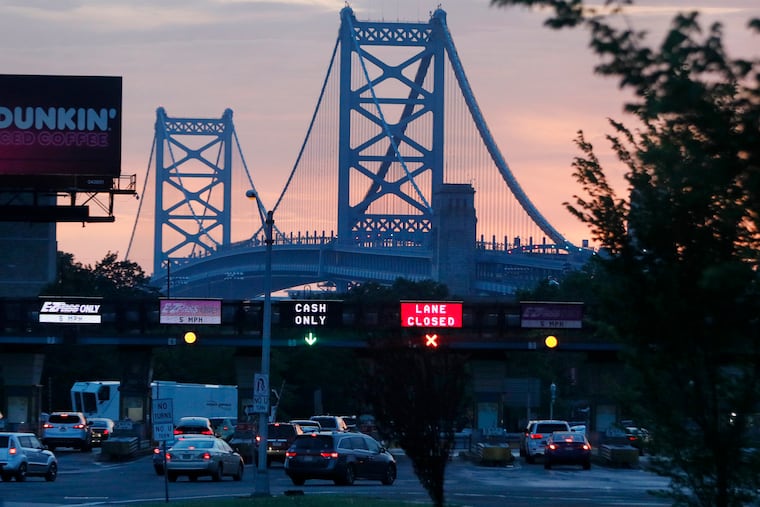DRPA sues NJ comptroller over an attempt to investigate its contracts and leases
The subpoenas, issued last month by the New Jersey State Comptroller’s Office, demand “a comprehensive list” of the authority’s contracts for goods or services.

The Delaware River Port Authority has asked a federal judge to block enforcement of subpoenas issued by a New Jersey watchdog seeking information about the transit authority’s vendors and contracts.
The subpoenas, issued last month by the New Jersey State Comptroller’s Office, demand “a comprehensive list” of the authority’s contracts for goods or services, including construction, legal, and financial services, from 2021 through last year, according to documents filed with the lawsuit. They also seek the authority’s leases with companies for property controlled by the DRPA, including a long-term agreement with port operator Holt Logistics Corp.
In a lawsuit filed this week in U.S. District Court in Trenton, the DRPA said the comptroller lacks the legal authority to investigate the bistate agency, which was created by Pennsylvania and New Jersey and approved by Congress. The DRPA owns and operates four bridges and the PATCO commuter line between Pennsylvania and New Jersey.
“The NJ Comptroller’s attempt to conduct investigations under authority granted to the NJ Comptroller under New Jersey law, and to further those investigations by issuing subpoenas under New Jersey law in an attempt to compel the DRPA to provide documents and witness testimony, infringes upon the DRPA’s sovereign authority under the compact and deprives the DRPA of its liberty, rights, and privileges secured under the United States Constitution and federal law,” the lawsuit says.
Pam Kruger, spokesperson for the Comptroller’s Office, said in a statement that “oversight is needed anytime there is concentrated power in order to protect New Jersey residents from fraud, waste, and abuse.”
“New Jersey residents want to be assured their tolls and train fares are being used responsibly,” Kruger said. “DRPA’s effort to prevent transparency and accountability by using public funds to sue a government watchdog is bad for both New Jersey and Pennsylvania residents, and it’s also inconsistent with the law. We are hopeful a judge will quickly direct them to cooperate with our inquiries.”
In addition to requests for documents — which hadn’t been previously disclosed — the Comptroller’s Office also issued a subpoena demanding “sworn testimony under oath concerning the Delaware River Port Authority’s collection and maintenance of records, and practice and procedures for responding to requests for information from government entities,” according to a copy of the subpoena that was included as an exhibit to the lawsuit.
That subpoena was addressed to Raymond J. Santarelli, the authority’s general counsel.
The DRPA offered to voluntarily provide the documents in exchange for the comptroller withdrawing the subpoenas, but the comptroller declined that offer, according to the suit.
The Comptroller’s Office says it audits government programs, investigates misconduct by public officials and employees, and scrutinizes contracts. The acting comptroller is Kevin D. Walsh, a former civil rights and housing lawyer who was appointed to the position by Gov. Phil Murphy, a Democrat, in 2020.
Walsh’s investigation comes two years after the DRPA’s Office of Inspector General issued a report finding that oversight of the authority’s rental agreements was lax and that some leases had been unchanged for years. “There are no policies or procedures related to management oversight of lease arrangements, and real estate activity in general,” the report said.
The Inspector General’s report also said certain land leases, including one with Holt, “did not have clearly defined lease termination dates” and “have continued at historically agreed-upon payment rates for many years without renegotiation of terms.”
The Inspector General recommended negotiating such leases to reflect current market rates, and DRPA management said in the report that it would do so.
One of the subpoenas issued by the Comptroller’s Office demanded “any and all documents” related to a 1984 lease for land beneath the Walt Whitman Bridge in connection with Holt’s wharf and marine terminal operations in Gloucester City.
The DRPA initially set annual rent at $19,000, or about $57,000 in today’s dollars, according to the Inspector General’s report. Holt’s rent was reduced to $1 in 1993 as part of an unrelated agreement. The rental arrangement hasn’t been updated since, according to the 2022 inspector general’s report, which recommended negotiating the lease at current market rates.
A DRPA spokesperson told The Inquirer in January that the agency “is completing the due diligence work necessary to take action.”
Holt spokesperson Kevin Feeley told the news organization earlier this year that a portion of the seven-acre parcel was “literally created by Holt in the 1980s when it built a new wharf at the adjacent Gloucester Marine Terminal, which today employs nearly 1,000 people.”
The leases “were negotiated fairly and with full consideration for both sides, including recognition of Holt’s improvements to the site” as well as use restrictions, Feeley said.
Reached on Thursday, Feeley noted that Holt is not a party to the lawsuit. “We have nothing to hide, and we will comply with the dictates of the court,” he said in a statement.
Beyond the Inspector General’s report, the DRPA’s contracting process came under scrutiny several years ago in the courts. A federal appeals court in 2017 described the authority’s decision to reject the lowest bidder on a bridge project as “illegal and irrational.”
The comptroller’s subpoena demands documents related to Alpha Painting & Construction Co., the company that submitted the lowest bid and later filed a lawsuit.
In a separate matter, Baltimore-based Alpha in 2018 was convicted on charges of defrauding the federal Department of Transportation.